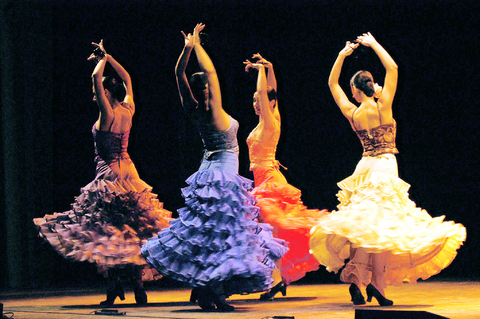Jose Greco Flamenco Dance Company wowed audiences on Friday night at the National Theater with shouting, leaping and a whole lot of stomping as they kicked off a weekend set of performances in Taipei with very energetic heels following a week-long tour of the island.
The first half of the show featured an anthology of Spanish dance.

Most of the pieces were ballet-inspired folk dances accompanied by the kind of canned orchestral music you might hear at the big top. Though the dances themselves were quite lively, perhaps more authentic music could have really brought out their folksy flavor.

PHOTOS COURTESY OF JOSE GRECO FLAMENCO DANCE COMPANY
Thankfully the live band did come out for Jose Greco's solo demonstration of the Serrana, a classic Andalusian form or palo of flamenco. All eyes were glued to Greco's fancy footwork from the first soulful strum of the guitar to Greco's final thundering stomp. With one cocky arm flung above his head, Greco gazed out over the awestruck audience. Applause erupted -- he had us just where he wanted us.
Possibly the only other highlight of the show's first half was when Carmela Greco, Jose's sister came out in a charcoal dress with a long ruffled train. Her dance, slow and stately, was punctuated by backward kicks to keep the dress' train in order, executed with the same haughtiness as if she were flinging long, flowing locks from her face.
The audience returned from intermission yearning for more of Jose Greco and that sultry guitar. They got it in the form of Los Tarantos, a Gitano Romeo and Juliet story adapted by Jose Greco to show off his and the company's skills. Greco played the pompous older peacock who claims the young beauty as his bride, and tries to tear her away from her lover. This was perfect for Greco, who used the vanity and machismo of his character as an excuse to treat the audience time and again to his jaw-dropping sequences of kicks and stomps.
Carmela, who played the matriarch, danced with the strength and sorrow of a woman weighed down by the world. Her slow, yet powerful movements provided a contrast to the wistful and frenetic dancing of the young lovers.
The confrontational scenes really brought out what might possibly be the true function of flamenco -- a glorified stomping contest.
These heated showdowns embodied the spirit of a genre that was born out of the pent-up frustration of persecuted peoples. The soulfulness of the Gitanos and the passion of the Moors combined centuries ago to produce the music and eventually the dance that became a symbol of Spanish national identity. On the stage Friday night, it became an expression of the fervent anger of desperate families.
Despite Greco's eye-popping moves, it was vocalist Gabarri Barrul Julio who really kept Los Tarantos going by inciting both the dancers and the audience to passion with his reverberating, melodic yells that sounded like an alternately furious and mournful call to prayer.
Meanwhile, the guitarists with their by turns gentle and violent strumming could have kept the audience rapt all by themselves.
By the end of it all, one was almost surprised that the dancers, musicians and their instruments didn't fall apart from exhaustion. But they were saving the best for the encore. As if the stage hadn't taken enough of a beating, the whole company came out stomping in unison.
Coaxed forward by Julio's impassioned hollering, each man took his turn freestyling with his best and wildest flamenco. Stomping their heels at lightning speed, kicking high in the air or shaking their entire bodies frenetically, these gentlemen were as much athletes as they were artists.
While female dancers in flowing skirts may be a symbol of the genre, the encore capped off a stirring demonstration of the fevered power that male dancers bring to Flamenco.
Jose Greco and his team spent enough energy out on that stage to keep the place heated up for a good chunk of the winter.

Cheng Ching-hsiang (鄭青祥) turned a small triangle of concrete jammed between two old shops into a cool little bar called 9dimension. In front of the shop, a steampunk-like structure was welded by himself to serve as a booth where he prepares cocktails. “Yancheng used to be just old people,” he says, “but now young people are coming and creating the New Yancheng.” Around the corner, Yu Hsiu-jao (饒毓琇), opened Tiny Cafe. True to its name, it is the size of a cupboard and serves cold-brewed coffee. “Small shops are so special and have personality,” she says, “people come to Yancheng to find such treasures.” She

Late last month Philippines Foreign Affairs Secretary Theresa Lazaro told the Philippine Senate that the nation has sufficient funds to evacuate the nearly 170,000 Filipino residents in Taiwan, 84 percent of whom are migrant workers, in the event of war. Agencies have been exploring evacuation scenarios since early this year, she said. She also observed that since the Philippines has only limited ships, the government is consulting security agencies for alternatives. Filipinos are a distant third in overall migrant worker population. Indonesia has over 248,000 workers, followed by roughly 240,000 Vietnamese. It should be noted that there are another 170,000

Hannah Liao (廖宸萱) recalls the harassment she experienced on dating apps, an experience that left her frightened and disgusted. “I’ve tried some voice-based dating apps,” the 30-year-old says. “Right away, some guys would say things like, ‘Wanna talk dirty?’ or ‘Wanna suck my d**k?’” she says. Liao’s story is not unique. Ministry of Health and Welfare statistics show a more than 50 percent rise in sexual assault cases related to online encounters over the past five years. In 2023 alone, women comprised 7,698 of the 9,413 reported victims. Faced with a dating landscape that can feel more predatory than promising, many in

Former Chinese Nationalist Party (KMT) chairwoman Hung Hsiu-chu’s (洪秀柱) attendance at the Chinese Communist Party’s (CPP) “Chinese People’s War of Resistance Against Japanese Aggression and the World Anti-Fascist War” parade in Beijing is infuriating, embarrassing and insulting to nearly everyone in Taiwan, and Taiwan’s friends and allies. She is also ripping off bandages and pouring salt into old wounds. In the process she managed to tie both the KMT and the Democratic Progressive Party (DPP) into uncomfortable knots. The KMT continues to honor their heroic fighters, who defended China against the invading Japanese Empire, which inflicted unimaginable horrors on the